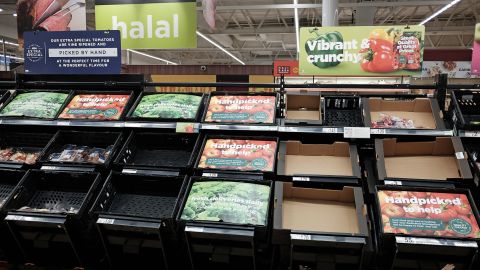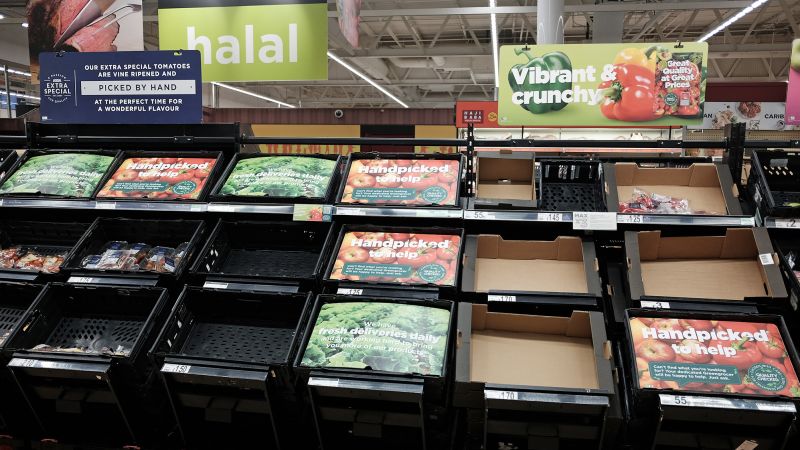London
CNN
—
Major UK supermarkets have started rationing the sale of some staple fruits and salad vegetables, blaming poor weather in Spain and north Africa for shortages that the UK government warned could last a month.
Tesco
(TSCDF), the UK’s biggest supermarket, confirmed to CNN Wednesday that it had temporarily capped the number of packs of tomatoes, peppers and cucumbers to three per customer.
Asda told CNN that it was temporarily limiting purchases of some items to three packs per customer. These include tomatoes, peppers, cucumbers and lettuce.
Morrisons told CNN that it had imposed a cap of two packs per customer on tomatoes, peppers, cucumbers and lettuce. And Aldi, a German discount grocery chain, announced that it would also introduce a limit of three packs per person on peppers, cucumbers and tomatoes in its UK stores.
“The suppliers are proactively working with supermarkets, that’s what we are being told,” Thérèse Coffey, the UK environment and food minister, told parliament Thursday. “We are being told there’s an issue for … up to four weeks.”
Asda, Morrisons and Aldi are Britain’s third-, fourth- and fifth-biggest supermarket chains respectively, according to market share data from Kantar.
Sainsbury’s
(JSAIY), the United Kingdom’s second-largest food retailer, told CNN it had no plans to ration the sale of fruit and vegetables.
The rationing is another knock for British shoppers already grappling with record grocery price rises, which have inflamed the worst cost-of-living crisis in decades.
In the four weeks to January 22, food price inflation hit 16.7%, according to Kantar. That’s its highest level since the data company started tracking the indicator in 2008.
“The more we face shortages, the more it will drive food inflation,” Minette Batters, president of the National Farmers’ Union (NFU), which represents more than 46,000 farming and growing businesses, told the BBC.
A spokesperson for the UK’s Department for Environment, Food and Rural Affairs (Defra) said in a statement Wednesday: “We understand public concerns around the supply of fresh vegetables. However, the UK has a highly resilient food supply chain and is well-equipped to deal with disruption.”
So what explains the empty shelves?
Asda and Morrisons pointed the finger at poor weather in key growing regions as the main driver of the shortages.
Andrew Woods, a sub-editor at Mintec, a commodities data company, told CNN that hotter-than-average weather in Spain and Morocco last fall, combined with a cold snap over the past two weeks, had hit production.
The tomato crop in southern Spain is 20% smaller than a year ago, he said.
The poorer harvests are problematic for UK retailers, reliant as they are on imports to fill their stocks at this time of year.
According to the British Retail Consortium (BRC), a trade group, UK supermarkets import 95% of their tomatoes and 90% of their lettuce in December, and typically import the same proportions in March.
James Bailey, executive director of supermarket Waitrose, told LBC radio Monday that snow and hail in Spain, as well as hail in parts of north Africa, had “wip[ed] out a large proportion” of key crops.
The high-end supermarket chain told CNN that it was “monitoring the situation” but had no plans to introduce rationing.
“Give it about [two weeks] and the other growing seasons in other parts of the world will have caught up and we should be able to get that supply back in,” Bailey added.
The BRC also says it expects the current disruption to last a few weeks before home-grown produce arrives to fill the gaps on UK store shelves.
“Supermarkets are adept at managing supply chain issues and are working with farmers to ensure that customers are able to access a wide range of fresh produce,” Andrew Opie, the BRC’s director of food and sustainability, told CNN.
High input costs have contributed to the shortages of fruit and vegetables, the NFU says, as well as reduced production across the farming sector more broadly.
“Labor shortages and soaring energy prices are hitting the poultry industry, already reeling from avian influenza, as well as horticultural businesses and pig farms,” Batters said in a speech Tuesday.
The price of natural gas — a key input for nitrogen-based fertilizers — shot up following Russia’s invasion of Ukraine last year. Though gas prices have fallen back in recent weeks, they are still triple their historical average, while fertilizer costs are up 169% since 2019, Batters noted.

According to the NFU, the production of tomatoes and cucumbers is expected to fall to the lowest levels since the union started keeping records in 1985, on the back of crippling input costs.
Woods at Mintec said processing and storing vegetables, such as tomatoes, was “energy intensive.”
Europe, too, has wrestled with many of the same problems in recent months.
“Across Europe, supplies [of tomatoes] are reportedly tight, and growers continue to grapple with higher fertilizer, energy and labor costs,” Mintec said in a note.
Yet, currently, there are few indications — in media reports or on social media — that retailers in other countries are rationing sales.
But Defra said in its statement Wednesday that “similar disruption is also being seen in other countries,” and that it was helping UK growers by expanding a visa scheme for seasonal workers to fill labor gaps.
UK supermarkets have not cited Brexit as a reason for the supply crunch. But the NFU and some campaign groups argue that it has worsened labor shortages.
Justin King, the former chief executive of Sainsbury’s, told BBC Radio 4 Thursday that, while weather problems in exporting regions were a big driver of the shortage, the UK’s supply problems “go further back.”
“This is a sector that’s been significantly disrupted by Brexit,” he said.
King noted that the United Kingdom used to grow “vast quantities” of tomatoes and cucumbers year-round in enormous greenhouses in Kent, a county in southern England.
But the government had not provided enough support to growers to pay their energy bills this winter, he added.
“We’re uniquely exposed to imports this time of year,” King said.
Direct subsidy payments to UK farmers from the European Union are also being phased out, which has increased uncertainty for farmers, Batters of the NFU said in her speech. The United Kingdom plans to fully implement its own subsidy scheme by 2024.
— Julia Horowitz and Olesya Dmitracova contributed reporting.

